Topic: The Greenhouse Effect
The Greenhouse Effect
Which event is inferred by most scientists to be responsible for a climate change that has recently led to a decrease in the size of most glaciers?
(1) a decrease in the rate of divergence of lithospheric plates along a mid-ocean ridge
(2) a decrease in the amount of insolation reaching Earth’s surface
(3) an increase in the amount of greenhouse gases in Earth’s atmosphere
(4) an increase in the amount of vegetative cover in the tropics
Which gas is considered a major greenhouse gas?
(1) methane
(2) hydrogen
(3) oxygen
(4) nitrogen
Which gas is a greenhouse gas that has increased in Earth’s atmosphere partly as a result of deforestation over the last 100 years?
(1) ozone
(2) oxygen
(3) nitrogen
(4) carbon dioxide
Most of the infrared radiation given off by Earth’s surface is absorbed in Earth’s atmosphere by greenhouse gases such as water vapor, carbon dioxide, and
(1) hydrogen
(2) nitrogen
(3) oxygen
(4) methane
Which diagram best represents how greenhouse gases in our atmosphere trap heat energy?
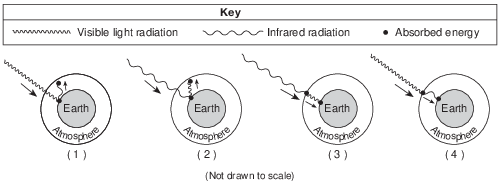
(1) 1
(2) 2
(3) 3
(4) 4
Which list contains three major greenhouse gases found in Earth’s atmosphere?
(1) carbon dioxide, methane, and water vapor
(2) carbon dioxide, oxygen, and nitrogen
(3) hydrogen, oxygen, and methane
(4) hydrogen, water vapor, and nitrogen
In addition to carbon dioxide, two other major greenhouse gases in Earth’s atmosphere are
(1) oxygen and nitrogen
(2) oxygen and methane
(3) water vapor and nitrogen
(4) water vapor and methane
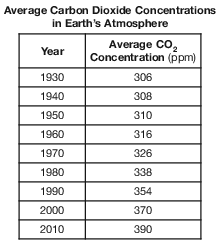
Identify one greenhouse gas, other than carbon dioxide, that contributes to global warming. [1]
Allow 1 credit. Acceptable responses include, but are not limited to:
• — methane or CH4
• — water vapor or H2O
• — nitrous oxide or N2O
• — ozone or O3
• — chlorofluorocarbons/CFCs
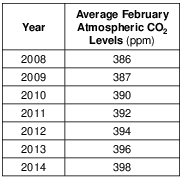
Identify one major greenhouse gas, other than carbon dioxide. [1]
Allow 1 credit. Acceptable responses include, but are not limited to:
• — water vapor/H2O
• — methane/CH4
• — nitrous oxide/N2O/NxO
• — ozone/O3
• — chlorofluorocarbons/CFCs
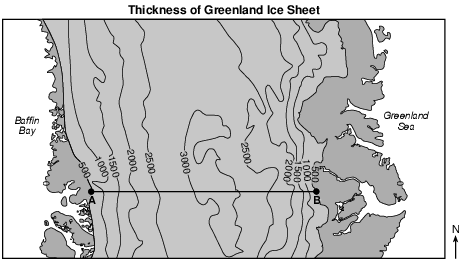
Greenland Ice Sheet
The Greenland Ice Sheet is a vast body of ice covering roughly 80 percent of the surface of Greenland. The ice sheet is almost 2400 kilometers long in a north-south direction. The ice sheet, consisting of layers of snow compressed over more than 100,000 years, contains a valuable record about Earth’s past climates. The ice sheet glaciers continue to flow seaward and deposit sediment, but global warming has affected them. Warmer air temperatures have caused increased melting, resulting in a thinning of the ice sheet and faster glacial movement at the ice sheet edges.
Identify two major greenhouse gases that are inferred to contribute to global warming and increased temperatures in Greenland. [1]
and _________________________________________
Allow 1 credit if both gases are correct. Acceptable responses include, but are not limited to:
• — carbon dioxide or CO2
• — methane or CH4
• — water vapor or H2O(g)
• — ozone or O3
• — nitrous oxide or N2O
• — chlorofluorocarbons/CFCs
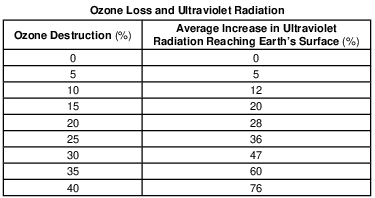
Ozone closer to Earth’s surface has been identified as a greenhouse gas. Identify two other gases in Earth’s atmosphere that are considered major greenhouse gases. [1]
__________________________________ and __________________________________
Allow 1 credit for two correct responses. Acceptable responses include, but are not limited to:
• — carbon dioxide/CO2
• — water vapor/H2O
• — methane/CH4
• — nitrous oxide/N2O
• — chlorofluorocarbons/CFC

The burning of fossil fuels, represented in D, produces the greenhouse gas carbon dioxide (CO2), which is associated with air pollution and global warming. Other than CO2, identify one other major greenhouse gas. [1]
Allow 1 credit. Acceptable responses include, but are not limited to:
• — CH4/methane
• — H2O gas/water vapor
• — N2O/nitrous oxide
• — O3/ozone
• — CFCs/chlorofluorocarbons
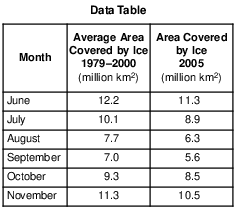
Identify one greenhouse gas that is believed to cause global warming. [1]
Allow 1 credit. Acceptable responses include, but are not limited to:
• — carbon dioxide or CO2
• — methane or CH4
• — water vapor or H2O gas
• — nitrous oxide or N2O
• — ozone or O3
• — chlorofluorocarbons or CFCs
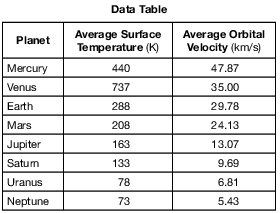
Approximately 97% of Venus’s atmosphere is carbon dioxide. Describe how carbon dioxide contributes to the unusually high average surface temperature of Venus. [1]
Allow 1 credit. Acceptable responses include, but are not limited to:
• — Carbon dioxide traps heat in the atmosphere.
• — Carbon dioxide absorbs infrared and reradiates it back to Venus.
• — Carbon dioxide is a greenhouse gas.

Most atmospheric scientists infer that global warming is occurring due to an increase in greenhouse gases. State the names of two greenhouse gases. [1]
(1)
(2)
Allow 1 credit if both responses are acceptable. Acceptable responses include, but are not limited to:
• — carbon dioxide/CO2
• — methane/CH4
• — water vapor/H2O
• — chlorofluorocarbons/CFCs
• — nitrous oxide/N2O
• — ozone/O3
